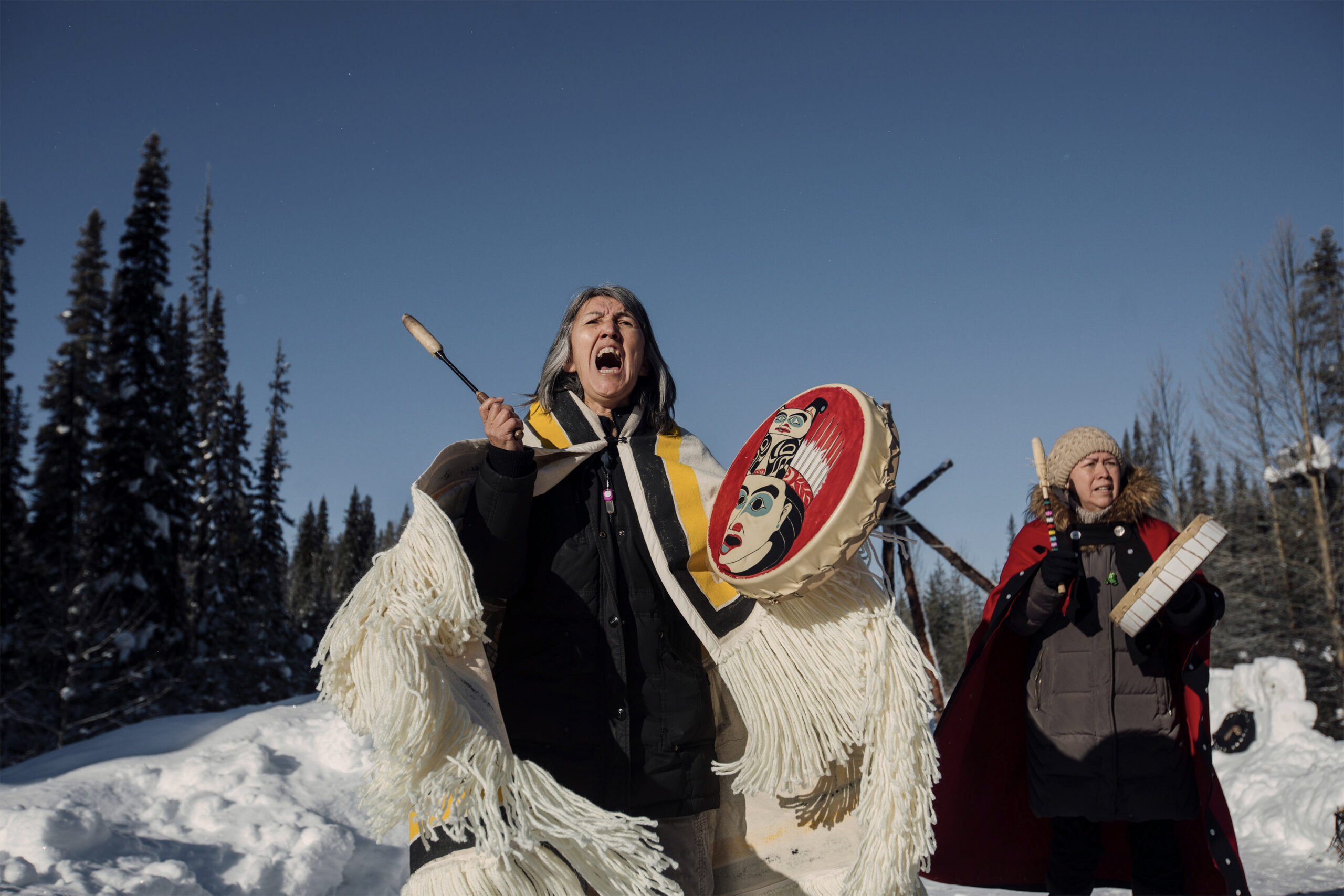“Ever since the United States became a nation in 1787, and Canada in 1867, Indigenous peoples exercising their sovereignty and self determination have been depicted as terrorists… when the state or a powerful corporation identifies an individual as a terrorist, they can act with impunity against even your most basic human rights”
— Joanne Barker
Between 2010 and 2021, the Wetʻsuwetʻen peoples were defending their land, Unisʻtotʻen Territory and waters from the Coastal GasLink pipeline in so-called British Columbia, Canada. Over this eleven year span, Indigenous nations surrounding Unitsʻtotʻen territory and others joined the Wetʻsuwetʻen in their fight, showing us the true power of collective struggle. While visible conflict between native nations and their colonizing and occupying states often draws larger public interest, YINTAH reminds us that the fruits of collective organizing are powerful sustenance for indigenous struggles over land and water rights, as they will continue to be the most “threatening” to nation states and corporations. It is this collective strength that inspires our colonizers to describe healing centers, cultural gathering places, and the peoples that build and protect them as “terrorists.”
This film takes you behind the frontlines and offers a firsthand look into the struggles, often labeled as “terrorist” actions, of protectors Tsakë ze’ Sleydo’ Molly Wickham and Tsakë ze’ Howilhkat Freda Huson. You are invited to witness what “terrorism” looks like around a campfire dancing to the beat of the drums and the songs of the Wetʻsuwetʻen people, how, even through defending land and waters, the Wetʻsuwetʻen create a safe space focused on healing their community by remember traditional practices and protocols. Filmed over a ten year period, YINTAH reminds us of reminds us of our own potential vulnerabilities as we peer into the intimate lives of these protectors, who are seeking to defend access to livable land and clean water for all people, while living away from the warmth and safety of their homes and families. Through this thoughtful, and often difficult portrait, you will come to love, and fear for the safety of these “terrorists” as they endure the bitter cold of winter and the vicious state violence that is unleashed upon them and their elders as they block the “road to progress”. Particularly if you are indigenous and have stood on your own frontline, these protectors will become your kin, your relatives in love and struggle.
I spent my twenties traveling across Turtle Island committing acts, such as kneeling on a temporary easement on the side of the road, labeled as “terrorism” in movements to protect water by blocking pipelines, and investing in Indigenous futurities. This label of “terrorism” is not unlike the accusations faced by our Black comrades during the Civil Rights movement and more recently in the Black Lives Matter movement. It is not dissimilar from the Palestinian struggles against a vicious genocide and oppression. They too endure this violent accusation of terrorism for simply fighting for their lives, lands, and waters.
On August 10, 2016, the day after I turned twenty-two, I was arrested at Standing Rock, North Dakota and charged with criminal trespassing and disorderly conduct. I was one of hundreds arrested during the movement to stop the Dakota Access Pipeline, a movement intimately connected to the Wetʻsuwetʻen people and their battle. Almost ten years after Standing Rock, I am still haunted by sounds of police helicopters roaring overhead, five pound mace cans being diffused, rubber bullets hitting bodies, screams from people being attacked by dogs, and creepy children’s songs over the walkies we used at camp intercepted by private security.
I am now a mother of two watching Tsakë ze’ Sleydo’ Molly Wickham, a member of the Gidimt’en clan and a mother of three standing to protect the lands and waters of her people. Unlike Molly, when I was living in frontline camps, I didn’t have kids. I cannot imagine how much more difficult it is to do what Molly and her family are doing, but we are connected to the land, and it is our responsibility to ensure its safety and well-being, much like our mothers do for us.
Malia Osorio is an ʻōiwi mom, aloha ʻāina, and visual artist born and raised in Hawai’i. Her work as an artist is rooted in cultural, political and environmental movements.
Beginning in 2010, Film for Thought (FFT), a collaborative program between the Hawai’i Council for the Humanities and HIFF, was born. Film For Thought is a special program designed to inspire critical discourse and community dialogue through the medium of film. Celebrating the longstanding relationship between HIHumanities and HIFF, FFT features a select group of films that resonate particularly with aspects of the humanities. As part of this programming, HIHumanities invites humanities scholars to respond to these selected films through written essays and panel discussions.



